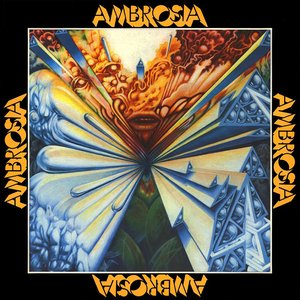Published on Feb 3, 2000
Now a largely-forgotten relic of the ’70s, Ambrosia has suffered
a fate that no artistic band should have to suffer. Their
self-titled debut was produced by the one and only Alan Parsons,
but like Parsons’ own band (sorry,
project), Ambrosia was a progressive outfit that
occasionally felt the need to streamline themselves just enough to
support their experiments with a huge adult contemporary hit. It
put food the table. Don’t get me wrong though – these hits were all
wonderful songs which were far better than most of their adult
contemporary contemporaries, but it’s too bad that Ambrosia will
probably be forever lumped in with groups like Firefall and Air
Supply, when they accomplished so much more.
It’s this debut in particular that showcases what a talented
band this was. Alan Parsons has, of course, never been in charge of
an album that sounded bad. He worked on
Abbey Road and
Dark Side Of The Moon, and of course a series of excellent
albums with his Project, chock full of music to play in
planetariums. On
Ambrosia, he was given the challenge to produce a group that
was more rock-oriented, and it really sounds great – the vocals are
up front, easy to hear, and full of energy. The guitars sound
bright and cheery, and the piano sounds full and bold – not your
typical ’70s band-in-a-box production values.
But lest Parsons steal the spotlight from the band who actually
wrote this album, we should mention that Ambrosia were not totally
faceless. Vocalist and bass guitarist Joe Puerta was later part of
the Range (as in Bruce Hornsby and), and lead guitarist David Pack
went on to write lots of movie music, and even had one extremely
minor hit in the mid-’80s (which if you can name, you are as sick
an ’80s nut as I).
Ambrosia does contain “Holdin’ On To Yesterday,” the first
of their hits, and probably the best. You still hear this a lot in
the “classic rock” format and it really is a classic; a fat Fender
Rhodes graces most of the chorus, and some of the saddest
“aaaahhhh”s ever to be used as harmonizing vocals grace most of the
verse. This is one of those tunes that makes us all long for the
days of real instruments and honest-to-goodness personality that
you just don’t hear in top 40 pop songs anymore. Ambrosia tried to
duplicate this sound with “How Much I Feel” a couple years later,
and it was a huge hit as well, but far more sentimental and far
less edgy.
One can only imagine what many a housewife (or househusband, I
suppose, let’s be politically correct) must have thought when after
hearing that sweet, sad song on the AM radio, decided to buy the
album and hear what else Ambrosia could do. The rest of the disc
aims far higher – “Nice, Nice, Very Nice” sets a passage from Kurt
Vonnegut’s
Cat’s Cradle to music and delivers a Utopian vision of the
world as melting pot, a Chinese dentist, a teenage rocker, Ginger
Rogers, all part of the “same machine.” Puerta sings this with a
slight Spanish accent but not a trace of humor. Pretentious? Very,
but kind of cute.
“Time Waits For No One,” not the Rolling Stones song, is more
successful, hinting a bit at Kansas or ELP when they’re not trying
to out-solo each other. “Make Us All Aware” and “World Leave Me
Alone” are both incredible too, the former a testimony to this
band’s tightness, and the latter a more traditional angry-young-man
rocker. More literary references pop up in “Mama Frog,” which
starts off on a trippy journey into wah-wah land, and then
metamorphosizes into a slow chant – incidentally, a similar
structure to a certain Doors song also with a Frog in it. But there
are no Lizard King musings here – instead, Ambrosia decides to
recite Lewis Carroll’s “Jabberwocky” IN ITS ENTIRETY in the middle
section. Pretentious? Extremely, but unique.
With only five albums, and a smattering of commercial
compromises to come later, Ambrosia will never be mentioned in the
same breath as the giants of ’70s progressive rock, but this album
and the follow-up
Somewhere I’ve Never Traveled are both excellent additions
to the collection of any fan of the genre.
Oh, what the hey, I may as well reveal that David Pack’s 1986
hit was called “Prove Me Wrong,” and it’s still in my
alphabetically sorted box of 45s between Jeffrey Osborne’s “Stay
With Me Tonight” and Ray Parker Jr’s “I Still Can’t Get Over Loving
You.” We are sick puppies here.
